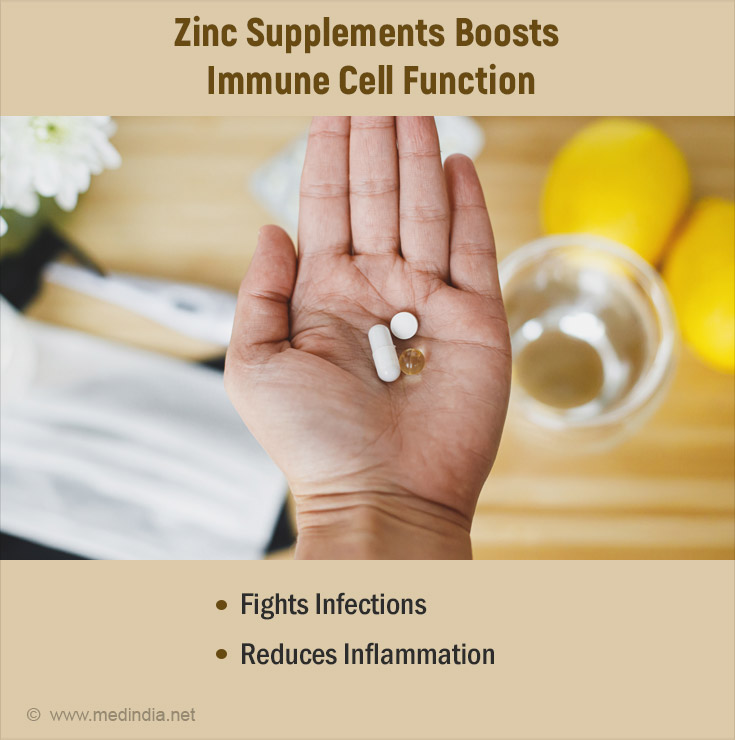- Zinc - (https://ods.od.nih.gov/factsheets/Zinc-HealthProfessional/)
- Zinc in Human Health: Effect of Zinc on Immune Cells - (https://pubmed.ncbi.nlm.nih.gov/18385818/ )
- Clinical, immunological, anti-inflammatory and antioxidant roles of zinc - (https://pubmed.ncbi.nlm.nih.gov/18054190/)
- Relating cytotoxicity, zinc ions, and reactive oxygen in ZnO nanoparticle-exposed human immune cells - (https://pubmed.ncbi.nlm.nih.gov/23997113/)
- Extracellular zinc competitively inhibits manganese uptake and compromises oxidative stress management in Streptococcus pneumoniae - (https://pubmed.ncbi.nlm.nih.gov/24558498/)
- The nutritional roles of zinc for immune system and COVID-19 patients - (https://www.frontiersin.org/journals/nutrition/articles/10.3389/fnut.2024.1385591/full)
- B cell activation and proliferation increase intracellular zinc levels - (https://pubmed.ncbi.nlm.nih.gov/30448545/)
- Zinc: a damage signal promoting thymic repair - (https://ashpublications.org/blood/article/139/25/3569/485577/Zinc-a-damage-signal-promoting-thymic-repair)
- The immune system and the impact of zinc during aging - (https://pubmed.ncbi.nlm.nih.gov/19523191/)
- Wound Physiology - (http://www.ncbi.nlm.nih.gov/books/NBK518964/)
- The role of antioxidant micronutrients in the rate of recovery of burn patients: a systematic review - (https://www.ncbi.nlm.nih.gov/pmc/articles/PMC4971700/)
About
Zinc is a crucial mineral that plays a big role in keeping our bodies healthy. It helps with many important processes, including boosting our immune system, healing wounds, and supporting the creation of proteins and DNA in our cells. Our bodies need zinc to function properly, and it can be found naturally in foods like meat, fish, and seafood. Zinc is also available as a dietary supplement and is included in some over-the-counter cold remedies and denture creams(1✔ ✔Trusted Source
Zinc
Go to source).
Think of zinc as a helpful assistant that supports our body’s natural defenses and speeds up the healing process when we get a cut or scrape. Without enough zinc, our immune system might not work as well, and wounds might take longer to heal. By including zinc-rich foods in our diet or taking supplements when needed, we can make sure our bodies have enough of this essential mineral to stay strong and healthy.
Did You Know?
Zinc can also improve your sense of taste and smell! Zinc deficiency is often linked to a reduced ability to taste and smell. #zinc #zincdeficiency
How Zinc Supports Immune Health
Zinc is required for the proper development and function of immune cells, such as T cells, B cells, neutrophils, macrophages, and natural killer (NK). Zinc deficiency may raise the risk of infection and induce severe immunological failure(2✔ ✔Trusted Source
Zinc in Human Health: Effect of Zinc on Immune Cells
Go to source).
Zinc regulates cytokine production and suppresses inflammation. Zinc's broad-spectrum antioxidant activities suppress the generation of reactive oxygen species (ROS) and prevent oxidative damage to cellular macromolecules(3✔ ✔Trusted Source
Clinical, immunological, anti-inflammatory and antioxidant roles of zinc
Go to source).
Zinc, in its positively charged ionic state, attracts pathogens for phagocytosis and then destroys them by producing ROS(4✔ ✔Trusted Source
Relating cytotoxicity, zinc ions, and reactive oxygen in ZnO nanoparticle-exposed human immune cells
Go to source). Zinc can impede Streptococcus pneumoniae's manganese uptake by competitive binding, reducing the bacteria's capacity to infiltrate and infect host cells(5✔ ✔Trusted Source
Extracellular zinc competitively inhibits manganese uptake and compromises oxidative stress management in Streptococcus pneumoniae
Go to source).
Zinc serves as a catalyst, structural component, and regulatory ion in a variety of immunological processes. It strengthens the immune system by raising the activity of both innate (neutrophils and NK cells) and adaptive (B and T ) cells. Zinc promotes neutrophil growth and activity. Zinc deficiency has been shown to impair neutrophil’s ability to kill pathogens by ROS-mediated phagocytosis. Furthermore, zinc supplementation has been shown to inhibit neutrophil recruitment, hence preventing lung injury. Zinc is essential for the growth, maturity, and activity of NK cells. Zinc supplementation has been shown to enhance CD34+ cell differentiation into NK cells as well as boost NK cell cytotoxicity(6✔ ✔Trusted Source
The nutritional roles of zinc for immune system and COVID-19 patients
Go to source).
In terms of adaptive immune cells, there is a positive correlation between intracellular zinc levels and B cell activation and proliferation. Zinc deficiency has been shown to impact the growth of immature and pre-mature B cells, as well as eventual antibody production(7✔ ✔Trusted Source
B cell activation and proliferation increase intracellular zinc levels
Go to source).
Zinc affects the proliferation and function of T lymphocytes. It regulates mature T cell activation through interactions with protein kinase C and lymphocyte protein tyrosine kinase. Zinc deficiency during T-cell maturation has been linked to increased pre-T cell apoptosis.
Reduced zinc levels can cause thymus atrophy and T-cell lymphopenia(8✔ ✔Trusted Source
Zinc: a damage signal promoting thymic repair
Go to source). A low zinc level has been reported to be associated with decreased type 1 to type 2 T-helper cell ratio, reduced interferon-gamma production, and compromised T-cell-mediated immune response. Zinc supplementation, on the other hand, has been shown to boost cellular and humoral immunity while reducing chronic inflammation(9✔ ✔Trusted Source
The immune system and the impact of zinc during aging
Go to source).
Zinc ions operate as a second messenger, modulating numerous immunological signaling pathways. It stimulates monocytes to create pro-inflammatory cytokines, which are required for the regulation of immunological and inflammatory responses to infections(10✔ ✔Trusted Source
Wound Physiology
Go to source).
Zinc promotes the synthesis of interleukin 2 (IL-2) by T cells, which is necessary for their development, proliferation, and differentiation into effector T cells. Zinc supplementation has been shown to restore the equilibrium of type 1 and type 2 T-helper cells by regulating cytokine production.

How Zinc Helps in Wound Healing
Wound healing is a normal physiological response to tissue injury. It is critical for repairing the protective epithelium barrier and regaining tissue volume and strength(11✔ ✔Trusted Source
The role of antioxidant micronutrients in the rate of recovery of burn patients: a systematic review
Go to source). Wound healing is strongly linked to inflammatory and immunological responses. Zinc's immunomodulatory effects contribute significantly to wound healing. Zinc deficiency has been linked to a delayed wound-healing process. Zinc supplementation has been shown to benefit the health of critically ill patients, those with severe burn injuries, subcutaneous abscesses, minor surgery, and pressure ulcers.
Zinc is essential for all stages of wound healing. Zinc's most important functions during wound healing include bacterial clearance, tissue necrosis, inflammation resolution, tissue debris removal, fibroblast and keratinocyte influx and subsequent re-epithelialization, angiogenesis and stem cell activation, and extracellular matrix remodeling. Individuals with zinc deficiency benefit from zinc supplementation for wound healing. However, research into the effect of zinc supplementation on wound healing in persons without zinc deficiency has yielded conflicting results.
Topical zinc sulfate formulations are widely used in wound treatment due to their antioxidant properties. Highly insoluble zinc oxide has been used in wound care due to its capacity to provide zinc to wounds for an extended period of time while also increasing collagen disintegration in necrotic wounds.
Daily dietary zinc supplementation is standard in severe burn care. Zinc oxide nanoparticles have garnered a lot of attention for wound healing in recent years due to their high cell penetration, immunomodulation, and antibacterial properties.









